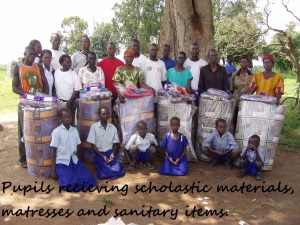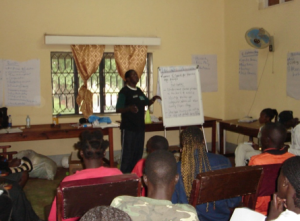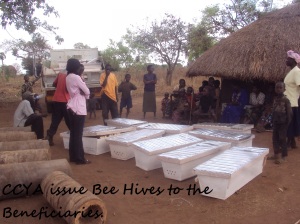CCYA youth-led community leads successful programs in the following areas:
a) Psychosocial Support
Multiplier TOT module, development and implementation of community action plans on psychosocial support, follow up of formerly abducted children in the community, provision of counseling services, community based reception and rehabilitation of Formerly Abducted Children (FAC), referrals of severe cases to other specialized service providers.

CCYA Youth provides psychosocial support through music dance and drama and sports.
b) Child protection and Education
CCYA Forms child protection committees, do community dialogue meetings, and support to community led initiatives on child protection, translation of key legal and policy documents into local languages, data collection on violation of children’s rights and supporting formal education for Orphans and Vulnerable Children in Northern Uganda.
The Ugandan government pays for public school teachers, where 1:100 teacher student ratios are considered acceptable! And a school needs more than just a few teachers. Children are assessed a modest fee of about $5 per semester. Many children cannot afford this.
Female students often drop out due to lack of privacy and sanitary materials. Female students are teased, bullied and embarrassed especially around the issue of their changing bodies, To address this CCYA does the following;
• Provide female partners with sanitary materials and advocate for them so they can go to school like everyone else. What would you do if this were you or your sister? You would act! We feel the same way!
• Seek out the most vulnerable children to partner with in their education. We support partners with scholastic materials, fees, and basic materials (including flip flops; our partners live in the bush and jungle and have no shoes). At present we support 45 children but the need is far greater.
• Make routine visits to check on our partners, speaking with their teachers, principals and checking their notebooks for completed assignments. These encouraging talks foster community care for the kids.
• Providing caregivers with fruits seedlings and train them to put up nursery beds for tress and fruits. This they can sell to enhance sustainability beyond the project cycle.
Beneficiaries receive scholastic and sanitary materials

c) Peace Building and Reconciliation
CCYA Trains Parents Support Groups and Youth Support Groups on peace building and conflict resolution, ongoing tracing and re-union, facilitation of community reconciliation and peace meetings, community and religious dialogues and consensus building on traditional justice systems, interactive games and sports among children and youth, development and implementation of peace, action plans, and dissemination of Information Education and Communication (IEC) materials to provide acceptance and reintegration.

CCYA youth are trained on peace building activities.
d) Advocacy
Following the 23 years of war, the youth and children have lost trust in people. Advocacy is a strategy through which CCYA addresses cross cutting issues in the community. Our staff has earned the right to speak for kids and youth who don’t trust many people. CCYA has been part of the community now and during tough times.
• When the LRA was there, we were there.
• When waves of refugees came through, our team gave its all for relief efforts.
• When the government needed to be convinced that people actually had been killed, we found proof and advocated on behalf of those whose voices were silent.
• When the camps teemed with people, we were there to organize games and teach about health and sanitation.
Broadcast radio is listened to by millions of people in Lango sub- region. This is therefore the most reliable way to reach the Lango sub-region. Even in the deep village, people tune in.
CCYA purchases radio time to inform the community about what they saw and urging the community to act in ways that make more of themselves, to have hope, and to realize that life can be better.
Photos from Radio Unity 97.7 FM in Lira town. The talk show had representatives from CCYA, the Lango Cultural Foundation, Lira NGO Forum and Uganda Police Community Liaison Department.
Results:
• Since 2001, the CCYA has hosted talk shows in English and in village vernacular on Radio Unity and Voice of Lango. The number of programs is only limited by their funds to purchase station time.
• The team creates catchy public service announcements to encourage the community. In 2010, the youth and kids ran a six month series of public service announcements to advocate for better care of the disabled and to discuss pervasive drug and substance abuse.
• Guests include government officials, journalists, and friends of CCYA.
• The community, including government officials, have honored what we are doing and have asked us to do more.
e) Environmental Protection and Conservation
CCYA trains Youth Support Groups, forms Environmental Protection and Conservation Clubs in schools, establishes a tree nursery which acts as a demonstration site and supplies tree seedlings to the community. CCYA opened a tree demonstration garden in 2010 which is used as a learning centre for tree growers, students and environmentalists.
Below are some of the seedlings in the CCYA demonstration site.
f) Livelihoods Support
Provision of sustainable and profitable means of livelihoods, training in Income Generating Activities and financial management, support to Orphans and Vulnerable Children (OVCs’) and young women to attain vocational skills and provision of basic start up tool kits to beneficiaries’ war affected communities.
CCYA together with our our partners; caregivers, children and youth raise honey and peanuts, tree seedlings and fruit seedlings for commercial sale. These high quality-organic products can be obtained from contacting our office.
See below demonstration of activities in picture
About Nehemiah’s Consumer Brands
Nehemiah was a great rebuilder in the Old Testament. He never had the luxury of concentrating on just one thing. He had to do it all: rebuild, defend himself and his team, and make sure that what he did promoted the health of his community.
• Nehemiah’s organic honey and bees wax comes from the purity of jungle harvested honey. Such honey and beeswax is prized all over the world for use in the purest of cosmetics to delicious, medicinal homeopathic remedies and natural sweeteners.
• The natural paste (sim sim peanut paste). The region is blessed with sim sim and pea nut grains. CCYA and partners process this to come up with a paste which is a very delightful cream used for enticing various meals.
CCYA Tree Nursery Demonstration site
 One of the CCYA Beneficiary Apiary Sites .
One of the CCYA Beneficiary Apiary Sites .
 CCYA delivers beehives and trains beneficiaries on how to use.
CCYA delivers beehives and trains beneficiaries on how to use.
g) Health
During the war, people fled from neighboring villages and were housed in refugee camps known as Internally Displaced Peoples’ camps. Despair, trauma, poverty, and idleness led to risky behavior, including the transmission of HIV/AIDS. The youth in Lira have contracted HIV/AIDS at a rate of 11.9%, almost twice the national average of 6.2%, HIV/AIDS drugs must be used by the people who are infected. CCYA does the role of making people aware the presence of drugs and does referrals on where to get and make follow ups.
This is done through: Behavioral Change Communication (BCC), awareness and sensitization, guidance and counseling, distribution of Information Education and Communication materials, HIV/AIDS Counseling and Testing and community outreaches.
Mental health. CCYA has identified the post war effects in youth characterized by street life, alcoholism, drug and substance abuse and with its partners seeks to implement through: guidance and counseling, radio talk shows, Youth rehabilitation and skills promotion/capacity building center and community outreach. This is an area that has been neglected and there is need for response.

